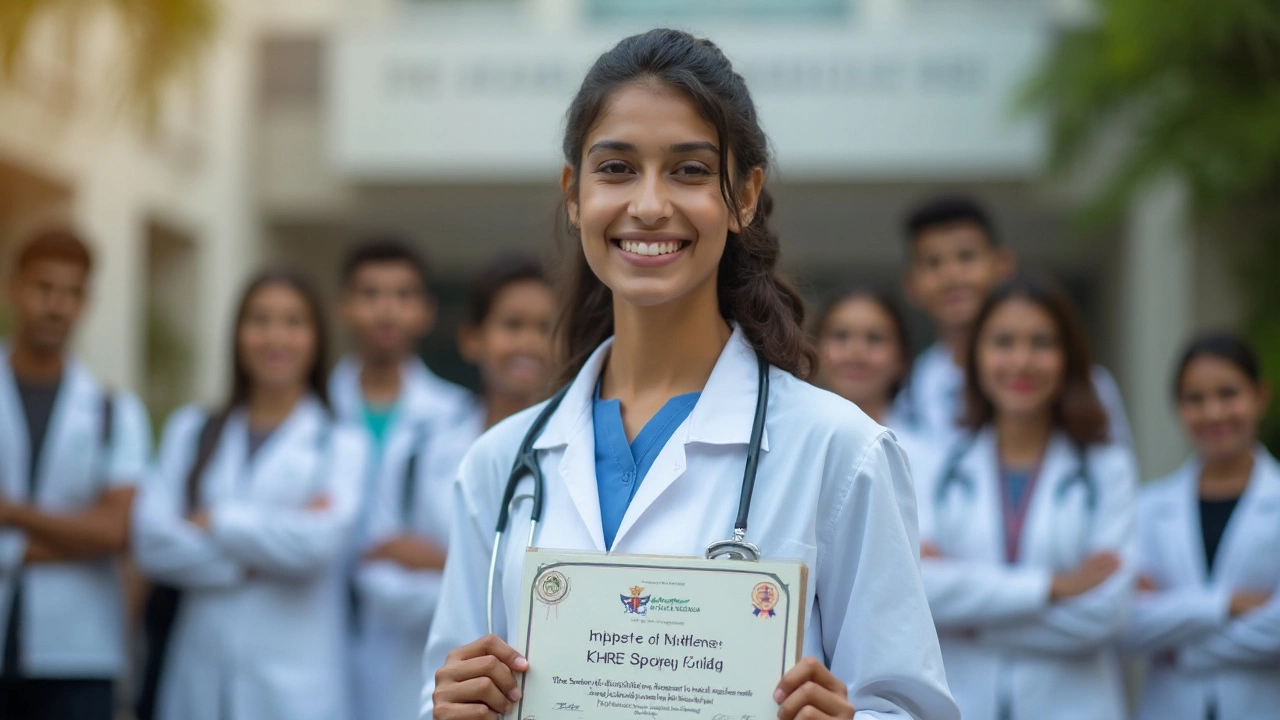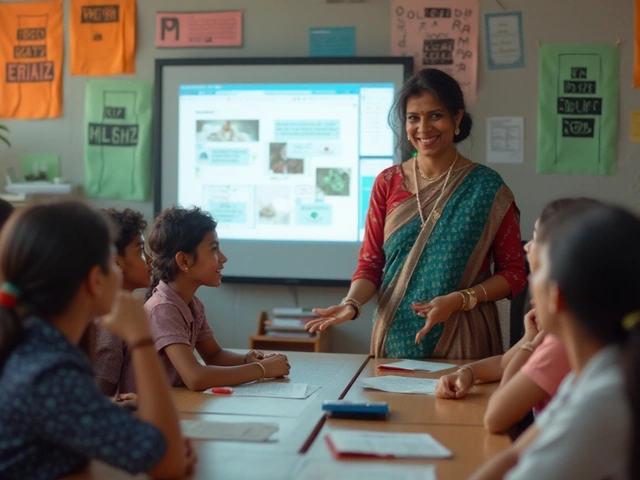Choosing the right academic board is a pivotal decision for students aiming to enter the medical field. One board that often stands out in conversations is CBSE, known for its widespread acceptance and streamlined curriculum. Understanding why CBSE might be the ideal choice for future doctors requires an exploration of its structure, benefits, and alignment with medical entrance tests.
Many students and parents find themselves at a crossroads, overwhelmed by options like state boards, IB, or ICSE. But CBSE carries unique advantages, especially for those whose eyes are set on a stethoscope and white coat. By the end of this read, you'll grasp the critical reasons and strategies for leaning towards CBSE when dreaming of a medical career.
- Importance of Choosing the Right Board
- Overview of CBSE Syllabus
- Benefits of CBSE for Aspiring Doctors
- Role in Medical Entrance Exams
- Tips for Maximizing CBSE Education for Medical Aspirants
Importance of Choosing the Right Board
Choosing the right educational board can feel like navigating a dense forest, teeming with paths that lead to different futures, especially when you're aspiring to be a doctor. It's not just about the present; it's about creating a foundation that will support every wall of knowledge you build in the future. With dreams of donning a medical coat and treating the sick, selecting a board aligned with your career goals becomes crucial. The syllabus and teaching methodology of your chosen board can significantly influence how well-prepared you feel for medical school and entrance exams. A well-structured path can make the arduous journey to becoming a doctor slightly smoother. CBSE is often touted as a preferred choice due to its widespread acceptance and focus on core subjects essential for medical education.
Why does the board choice matter so much? For starters, the curriculum influences both learning styles and examination approaches. Each board has its unique way of presenting information, and this can either enhance understanding or create obstacles in learning. For students aspiring to medical fields, where exams are rigorous and competition is fierce, the right board can help build crucial problem-solving skills. Moreover, consistency in syllabus throughout the country means that students under the CBSE umbrella have uniform preparation, which is particularly beneficial for competitive exams like NEET. As you're tested on these subjects in depth, consistency can be a game-changer.
"Education is the passport to the future, for tomorrow belongs to those who prepare for it today." — Malcolm X
Additionally, when considering options, it's essential to reflect on how your chosen board embraces and adapts to new teaching methodologies and technologies. With the world embracing digital advancements at a rapid pace, a board that integrates modern tech into learning can offer students an edge. This is another area where CBSE has taken significant strides by adapting its curriculum to include digital learning resources and up-to-date teaching practices. Not to mention, choosing the right board is also about aligning with an educational entity that emphasizes critical thinking, an essential skill for any doctor. Beyond the textbooks, it's about nurturing the ability to question, deduce, and connect knowledge.
Moreover, in the journey of becoming a doctor, the ability to access a network of support and guidance is essential. While all boards offer a framework, some allow greater access to supplementary online and offline resources, mentoring opportunities, and workshops. CBSE has established itself as a leader in this regard, thanks to its vast network of schools and alumni, making it easier to find mentorship and peer support. It's not just the syllabus but the ecosystem of learning that a board fosters which can make a difference in a student's confidence and ability to excel.
Overview of CBSE Syllabus
The Central Board of Secondary Education, commonly referred to as CBSE, is one of India's most prominent educational boards, renowned for its rigorous and comprehensive curriculum. Designed to cater to a diverse student population across the nation, the CBSE syllabus aims to equip students with foundational knowledge and critical thinking skills. Its focus is rooted in developing scientific temper, analytical abilities, and creativity, which are crucial traits for any aspiring doctor.
At the crux of CBSE's structure lies its emphasis on a balance between academic breadth and in-depth learning. The syllabus distinctly highlights core subjects such as Mathematics, Science, and English, with avenues for practical knowledge through laboratory work, projects, and experiments. This approach is particularly beneficial for those aiming for medical careers, as it lays a solid groundwork for understanding complex scientific concepts that are pivotal in medical studies.
One of the standout features of CBSE is its national standardization, which ensures consistency in educational quality across the board, irrespective of geographical location. This means a CBSE student in Delhi studies the same material and undergoes the same assessments as a student in Chennai, ensuring a level playing field. Such uniformity in learning materials and evaluation techniques is particularly advantageous when preparing for nationwide medical entrance exams like NEET, where a standardized understanding of subjects is beneficial.
CBSE's curriculum is meticulously structured, making it highly conducive for competitive entrance exams. The syllabus is updated regularly to align with contemporary academic and professional requirements. In a quote from the CBSE Chairperson, it was mentioned that "the evolving curriculum is designed with the future in mind, adapting to the changing needs of higher education and professional environments." This constant evolution ensures that students are not only well-prepared for current academic challenges but are also equipped with the skills necessary for future success in the medical field.
A look at the grading system reveals that CBSE employs a continuous evaluation method alongside term-end assessments. This dual strategy helps in reducing the stress associated with final exams, enabling students to focus on consistent learning. Such continuous assessment is a boon in medical studies as it mirrors the ongoing learning and evaluation process that medical professionals go through, fostering resilience and adaptability.
| Subject | Weightage in Exams |
|---|---|
| Physics | 30% |
| Chemistry | 30% |
| Biology | 40% |
The syllabus also incorporates value education, environmental studies, and physical education, which holistically enrich students' educational journeys. These subjects encourage students to explore beyond textbooks, engaging in activities that enhance their socio-cultural understanding and physical well-being. This holistic development is pivotal for budding doctors who are expected to show empathy and maintain physical stamina.
In summary, the CBSE syllabus not only offers a standardized and comprehensive academic foundation but also prepares students for lifelong learning. With its focus on both theoretical and practical knowledge, CBSE acts as an excellent springboard for students aspiring to join the medical profession. It beautifully intertwines academic prowess with skills essential for shaping competent and successful doctors of the future.

Benefits of CBSE for Aspiring Doctors
The CBSE board has established itself as a prominent educational framework in India, offering a comprehensive curriculum that perfectly aligns with the requirements of medical career aspirants. One of the significant benefits of CBSE is its national recognition, which provides students with the flexibility to apply to medical colleges across the country without discrepancies in syllabus understanding. This board adheres to the guidelines set by the National Council of Educational Research and Training (NCERT), ensuring that the content taught across schools is uniform, precise, and relevant.
The CBSE syllabus emphasizes a strong foundation in both theoretical and practical aspects of subjects, particularly in Science and Mathematics. These subjects are pivotal for students planning to take medical entrance exams such as NEET, which heavily test these areas. The NCERT textbooks prescribed by CBSE are well-known for their clarity, comprehensive coverage, and are often considered the best study material for these exams. This relevance not only prepares students for their board exams but also equips them with the required knowledge for entrance exams, providing them with an edge over peers from other educational boards.
Moreover, CBSE's commitment to integrating new teaching methodologies, including the use of digital tools and interactive learning techniques, significantly enhances the understanding and retention of complex subjects. This approach supports students in developing a thorough understanding, which is crucial when dealing with the intricate concepts of human anatomy, chemistry, and biology required in medical studies. A survey by the Association of Indian Universities (AIU) found that a significant percentage of successful medical candidates were from the CBSE board, highlighting its effectiveness.
Another essential aspect of CBSE is its focus on overall student development. Alongside core academics, the board encourages participation in extracurricular activities that promote critical thinking and problem-solving skills. Such skills are invaluable in the medical profession, where practitioners often face complex challenges that require innovative solutions. A statement by Dr. Ramesh Pokhriyal, India’s former education minister, aptly encapsulates this, "CBSE is not just about academic excellence; it builds a foundation for a promising career and responsible citizenship."
The structure of the CBSE board exam is quite similar to that of most entrance exams. This similarity in format offers students a familiar setting, reducing anxiety and boosting confidence during the actual examination. Students accustomed to the rigorous CBSE exam pattern tend to develop better time management skills and the ability to handle exam pressure, key traits that benefit them immensely during medical entrances where time is a critical factor.This advantage is complemented by the focus on application-based learning over rote memorization, an approach increasingly valued in medical education.
"Education is the passport to the future, for tomorrow belongs to those who prepare for it today." - Malcolm X
| Percentage of NEET Qualifiers from CBSE |
|---|
| 60% |
| NEET Top Rank (2023): CBSE Students |
| 5 out of Top 10 |
Role in Medical Entrance Exams
Preparing for medical entrance exams in India, like the NEET (National Eligibility cum Entrance Test), can be a challenging journey. A significant advantage of following the CBSE curriculum is its strong alignment with these exams. CBSE's syllabus is often considered closely tied to the NEET syllabus, which prominently features subjects like Physics, Chemistry, and Biology. Students who study under the CBSE board generally find that they have covered most or all of the NEET topics during their school years, giving them a solid foundation to build upon. This correlation can significantly ease the burden of extra coaching or self-study, reducing the stress levels commonly associated with such a rigorous test.
One key aspect is that CBSE has standardized the method of teaching core subjects, ensuring that students have a clear understanding of fundamental concepts. This clarity is crucial, as NEET is not just about rote memorization but also about understanding and application of ideas. The structured pattern of CBSE not only aids in conceptual clarity but also cultivates analytical thinking and problem-solving skills, which are indispensable for cracking medical entrance exams. Additionally, CBSE's emphasis on regular assessments, including multiple-choice questions, somewhat mirrors the NEET pattern, where the ability to quickly and accurately answer such questions can make a significant difference.
A 2018 survey indicated that about 60% of NEET toppers came from CBSE-affiliated schools, showcasing the board's efficacy in prepping students for such competitive exams. This fact alone provides reassurance to many aspiring doctors about the choice of board. Moreover, the CBSE board's core focus extends beyond academics to develop a student's confidence and ability to perform under pressure, both of which are vital during the minutes spent in the exam hall.
"The CBSE syllabus has been designed to help students excel not only in academics but in any medical entrance exams," remarks a renowned educator with decades of experience in mentoring NEET aspirants. Such insights reflect the emphasis CBSE places on preparing students for their future educational pursuits effectively.
It's equally important to understand that the timeline followed by CBSE plays a crucial role during NEET preparation. The board optimizes its schedule to ensure that board exams conclude with adequate time for additional focused NEET coaching, a factor that is often overlooked but is of paramount importance for time management and stress reduction. Lastly, regarding resources, CBSE students often have easy access to a plethora of books and materials specifically designed to prepare them for NEET, thanks to its widespread adoption across India, making it a favorable choice for any medical aspirant.

Tips for Maximizing CBSE Education for Medical Aspirants
For students aspiring to pursue a career in medicine, maximizing their CBSE education requires a thoughtful approach. The CBSE curriculum is designed with a strong emphasis on core subjects, particularly science and mathematics, which form the backbone of medical studies. A strategic approach towards these subjects can significantly enhance understanding and retention, laying a solid foundation for future studies. Students should focus on developing a study plan that prioritizes clarity and depth in their understanding of concepts, which is essential when preparing for rigorous medical entrance exams.
To truly excel, students are encouraged to go beyond rote learning and immerse themselves actively in the subjects. Engaging with teachers, participating in discussions, and forming study groups can provide new perspectives and insights that spark deeper interest and knowledge retention. Leveraging school resources such as laboratories for practical experiments can further solidify theoretical concepts, making topics that appear abstract in textbooks much clearer and more tangible. Parents and educators can also play a crucial role in encouraging this inquisitive mindset.
Time management and consistency are pivotal in making the most out of CBSE studies. Creating a well-structured timetable devoted to balancing various subjects alongside hobbies and relaxation is vital. This not only prepares students mentally for the disciplined life of a medical professional but also helps in handling pressure efficiently. With NEET being one of the key entrance exams, familiarity with its pattern and question types should be part of the preparatory strategy. Regular mock tests and solving previous years' question papers can greatly enhance one’s confidence and reduce exam-related anxieties. Medical career aspirants can benefit immensely from these practices.
Technology can be an ally if used wisely. Access to online resources, such as educational platforms and video lectures, can reinforce classroom learning. These resources often present information in varied formats which can cater to different learning styles, whether visual, auditory, or kinesthetic. Additionally, being part of online communities dedicated to CBSE students offers peer support and the sharing of tips and resources, expanding the learning experience beyond classroom walls.
A 2018 study conducted on educational outcomes amidst CBSE students reflected significant improvement in scientific aptitude for those engaging frequently with additional resources. Schools can further bolster this shift by integrating modern teaching aids and technology in classrooms. As Richard Dawkins once said, "Science is the poetry of reality," inspiring students to explore the beauty of life's complexities through science itself. Here is where CBSE's methodical curriculum gives students an edge by keeping them engaged intellectually and curious about the workings of the world around them.
In sum, maximizing the CBSE curriculum for aspiring doctors involves a blend of strategic study habits, active engagement in the learning process, effective time management, and the wise use of technology. Each of these elements prepares students not only for exams but for the lifelong commitment to learning that the field of medicine demands. By adopting these strategies, students can navigate their educational journey with clarity and purpose, setting the stage for successful medical careers.









0 Comments